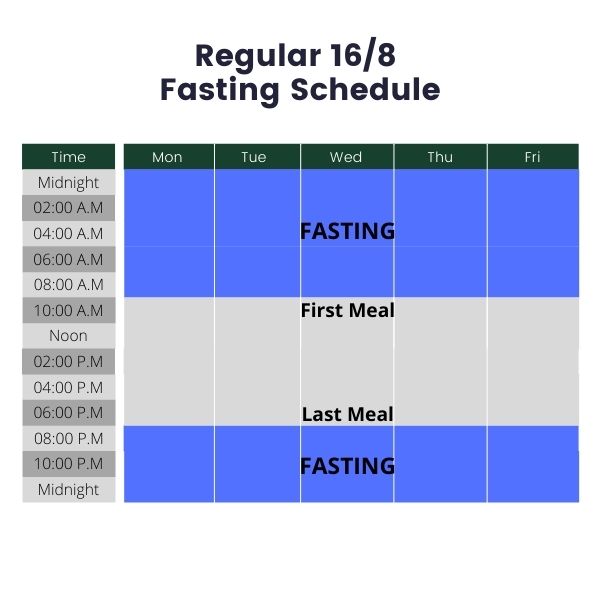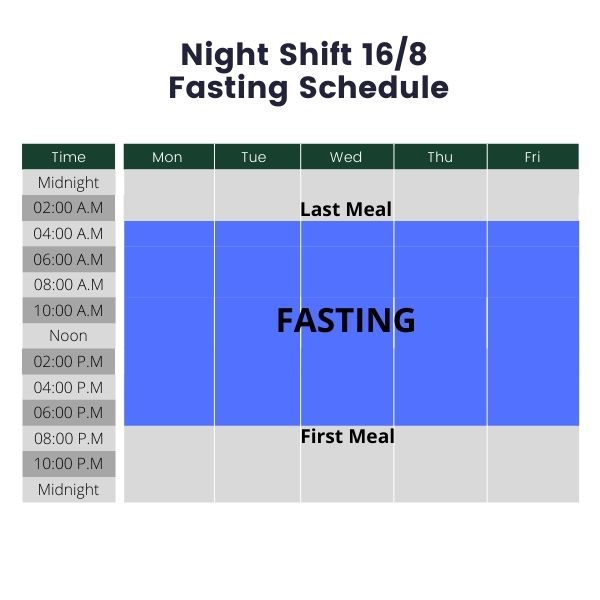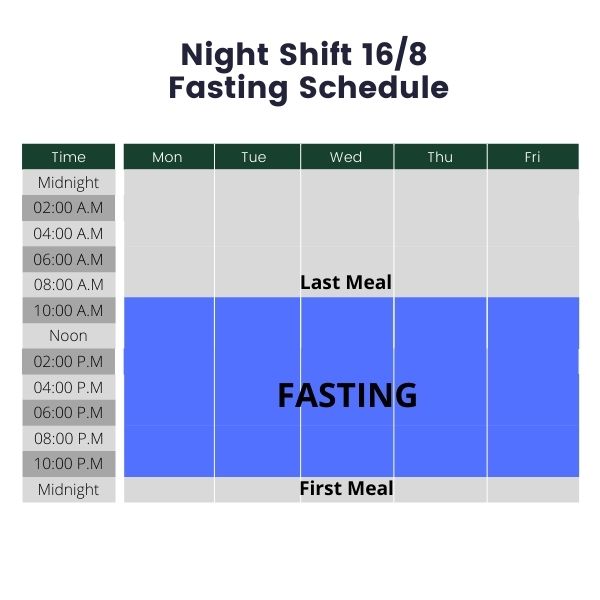If you are a night shift worker, you have probably dabbled your way into intermittent fasting.
In case you haven’t, this article is for you.
Over the following few sections, we will discuss how intermittent fasting works on night shifts.
Additionally, we will also share some simple tips that will help you fast better during your shift window.
So, if you want to start getting all the benefits from intermittent fasting for night shifts, here’s everything you need to do!
Can You Do Intermittent Fasting For Night Shift?
As you probably know, intermittent fasting is a form of cyclic fasting which involves not consuming food for a specific period.
The most important thing to know is that it is time restrictive, not food restrictive.
This means that you can choose any schedule to do your fasting depending on your needs.
In this article, we will only discuss the 16 / 8 schedule to keep it simple.
Having said that, it is certainly possible to perform intermittent fasting on a night shift.
Basic Things To Know Before Starting
Because the nature of fasting is extremely flexible, you can also choose a technique that suits your shift and requirements the best.
Contrary to common misconceptions which claim energy loss and weakness, intermittent fasting will actually boost your focus and help you work better during the shift hours.
When you fast according to the correct process, you will effectively counterbalance the negative impact that you often experience while working night shifts.
It will allow you to take control of your systemic composition, help lose fat, and play a crucial role in keeping your lean mass consistent.
Intermittent fasting also helps with insulin resistance which is crucial to prevent certain adverse impacts that you often encounter during the third or last night shift.
At the same time, when you fast consistently, your growth hormone levels will consistently rise, and you will be more youthful and gracious than ever.
Finally, intermittent fasting will also boost your lifespan, and if you perform it during your night shifts, the benefits will continue to be the same.
Related Article: Does Collagen Break A Fast
Night Shift Schedules | Understanding The Implications
Before practicing intermittent fasting at night, it is crucial to understand 3 things.
1. What Is Your Night Shift Schedule?
Typically, you will find 3 common shift types.
- Evening Shift: Working from 6:00 P.M. to 10:00 P.M.
- Night Shift: Working anywhere between 10:00 P.M. – 4:00 A.M
- Early Morning: Working between 2:00 A.M to 8:00 A.M
Bearing that in mind, depending on whether you are a nurse, a taxi driver, or any other job that has a night shift, the schedule may vary.
2. Is Your Night Shift Schedule Rotating Or Fixed?
The benefit of having a fixed night shift is that you can be consistent with your eating and fasting window.
If you fall into the rotating shift, you will probably need more planning to fulfill the fasting on a daily basis or will have to sacrifice some days since the schedule is so irregular.
3. What Is Your Sleeping Schedule?
This question is probably more important than the other 2.
Why?
When you sleep, you naturally fast since you are not eating, so the easiest way to decide your fasting window is to work around your sleeping hours, not around your working hours.
What do we mean?
Let’s look first at a typical intermittent fasting schedule. This is for someone working between the 8:00 A.M to 6:00 P.M. window.

In this scenario, the person is probably sleeping somewhere between 10:00 P.M. and 6:00 A.M. This means that this person just added 3 to 4 hours before and after the sleeping window to make the 16-hour fast.
What happens if your sleeping window is right after the night shift?
In this case, we are assuming you are sleeping somewhere between 6 A.M and 2 P.M.

As you may have noticed, we applied the same formula. Just add a few hours before and after the sleeping schedule to achieve the 16-hour fast.
What happens if you decide to stay up all morning and go to sleep at noon?
In this scenario, we are assuming a sleeping schedule between 12 PM and 8 PM

If you notice, in both cases, you can work from 10 PM to 4 AM and achieve your fasting hours. The difference was… your sleeping schedule.
Related Article: Does Metamucil Break A Fast
How To Fast On A Night Shift?
If you want to fast on a night shift, first choose the right eating window.
Have your meal properly and after you start working, try to stay hydrated.
Drink plenty of water while working. This will not just keep you full but also cleanse your digestive system and keep you active throughout the night shift.
Having said that, intermittent fasting and drinking only water may not be the best idea for people who are involved in physically strenuous tasks. So, ensure you eat plenty of nutrient-rich foods during your eating window. This applies to both sets of people, including the ones with a desk jobs. As a rule of thumb, try to consume food only during daylight hours. This will allow your body to sustain a properly natural process.
If the concept itself is extremely new to you, do this twice or thrice a week until you are comfortable with a more proper schedule.
Tips to achieve better results
- Avoid comparing yourself with people and fast at your own pace. You will soon achieve the magical 16-hour number this way.
- Understand your eating habits before starting a schedule. What suits you best? Do you like eating before or after work?
- Socialize with people
- Eat plenty of nutrient-rich food during your eating window
Common mistakes to avoid
Here are a couple of common mistakes to avoid when you are trying intermittent fasting during a night shift:
- Avoid eating junk during your eating window.
- Avoid drinking plenty of tea, coffee, or sugar-based drinks.
- Instead of eating sweet fruits, try eating fruits like cucumbers that come with plenty of water content.
- This will keep you hydrated during the fasting period.
Bottom Line
Intermittent fasting as a concept might appear intimidating at the outset. But that is far from reality. When done correctly, you can easily make it work even if you are operating on a night shift.
Several nurses and medical professionals already do it because of their erratic schedules, and given the many benefits, the process offers, you might as well want to join the bandwagon.
With intermittent fasting, you will gain greater focus, and your energy will be at its highest. Because we also shared some tips for better fasting, you will find it even easier to sustain the entire night shift without procrastinating or feeling down.
The key idea is to do the fasting around your sleeping window hours, not your working hours.
Try following these guidelines and start your fitness journey right away!

Hello to all, it’s actually a nice for me to visit this website, it includes useful Information.
I cannot thank you plenty for the article post.Much thanks again. Awesome.
Kalau bicara soal dunia slot online, biasanya kalian langsung teringat
pada penampilan warna-warni, suara putaran gelung,
dan kejutan kecil yang tiba-tiba muncul saat simbol-simbol itu sejajar.
Ahaa, its pleasant dialogue on the topic of this post
here at this weblog, I have read all that, so now me also commenting here.
Very good post. I am dealing with a few of these issues as well..
Деятельность в области недропользования — это комплекс работ, связанный с освоением природных ресурсов.
Оно включает разведку полезных ископаемых и их промышленное освоение.
Эта отрасль регулируется законодательством, направленными на сохранение природного баланса.
Грамотный подход в недропользовании помогает сохранять ресурсы.
общество экспертов России по недропользованию
Great post however , I was wondering if you could write a litte more on this subject?
I’d be very grateful if you could elaborate a little
bit further. Kudos!
Hey I know this is off topic but I was wondering if you
knew of any widgets I could add to my blog that automatically tweet my newest twitter updates.
I’ve been looking for a plug-in like this for quite some time and was hoping maybe you would have some experience with something
like this. Please let me know if you run into anything. I truly enjoy reading your blog and I look forward to your new updates.
Good information. Lucky me I found your site by chance (stumbleupon).
I’ve book marked it for later!
It’s enormous that you are getting ideas from this article as well as from our dialogue made at this
time.
Hey there! I just wanted to ask if you ever have any problems with hackers?
My last blog (wordpress) was hacked and I ended up losing months of hard work due to no data backup.
Do you have any solutions to prevent hackers?
I was able to find good information from your blog articles.
I needed to thank you for this fantastic read!!
I absolutely loved every bit of it. I have you book
marked to look at new things you post…
Do you have any video of that? I’d love to find
out some additional information.
Оформление вида на жительство в другой стране имеет ключевое преимущество.
Этот статус предоставляет законную возможность на длительное пребывание в нужной стране.
купить диплом мастера по фистингу
Такое разрешение гарантирует полный доступ к национальному здравоохранительному обслуживанию и образованию.
Наличие вида на жительство существенно упрощает процесс банковского сотрудничества и открытия бизнеса.
В конечном счёте, это является первым этапом к постоянному проживанию или возможно второму гражданству.
I don’t even know how I stopped up right here, but I thought this publish was once great.
I don’t know who you might be however definitely you are
going to a famous blogger if you are not already. Cheers!
Howdy just wanted to give you a quick heads up. The words in your article seem to be running off the screen in Ie.
I am really loving the theme/design of your weblog. Do you ever run into any browser compatibility issues? A few of my blog readers have complained about my site not working correctly in Explorer but looks great in Firefox. Do you have any advice to help fix this issue?
Hiya! Quick question that’s totally off topic. Do you know how to make your site mobile friendly? My site looks weird when browsing from my apple iphone. I’m trying to find a template or plugin that might be able to correct this issue. If you have any suggestions, please share.
Hello! I just would like to offer you a huge thumbs up
for the excellent info you have here on this post. I will be returning to your site for more soon.
This is my first time visit at here and i am really happy to read everthing at alone place.
Please let me know if you’re looking for a writer for your blog. You have some really good articles and I think I would be a good asset. If you ever want to take some of the load off, I’d love to write some articles for your blog in exchange for a link back to mine. Please shoot me an e-mail if interested. Thanks!
This resource contains a vast amount of valuable material.
Visitors can find detailed articles on various subjects.
All data is laid out in a clear manner.
It’s a perfect spot for anyone wanting knowledge.
http://www.gladaankan.com
I am really impressed together with your writing skills and also with the format on your weblog. Is this a paid theme or did you customize it yourself? Either way stay up the excellent quality writing, it is rare to look a great blog like this one nowadays..
Hey there! This is kind of off topic but I need some guidance from an established blog.
Is it very hard to set up your own blog? I’m not very techincal
but I can figure things out pretty fast. I’m thinking about creating my own but I’m not sure where to start.
Do you have any points or suggestions? With thanks
Hi! Quick question that’s totally off topic.
Do you know how to make your site mobile friendly?
My blog looks weird when browsing from my iphone 4. I’m trying to find a theme or
plugin that might be able to fix this problem. If you have
any suggestions, please share. Many thanks!
Does your blog have a contact page? I’m having a tough time locating it but, I’d like to shoot you an email. I’ve got some creative ideas for your blog you might be interested in hearing. Either way, great blog and I look forward to seeing it improve over time.